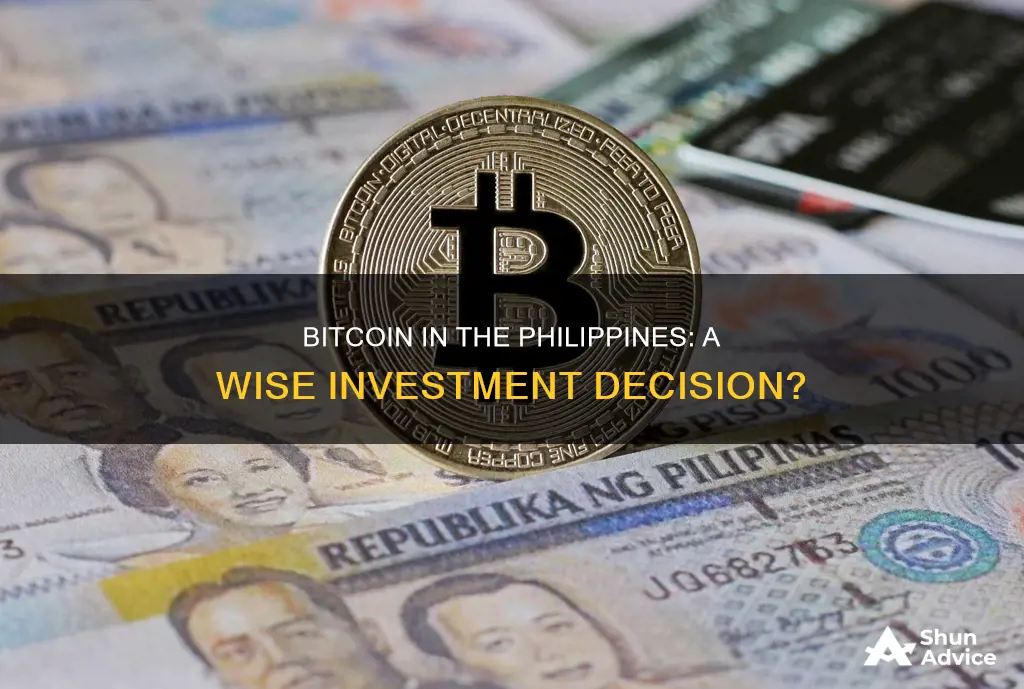
Bitcoin is a digital currency that has risen in popularity among investors in recent years. It is a decentralised, peer-to-peer system for online payments that cuts out middlemen such as banks and remittance centres. Bitcoin is also a medium of exchange or store of value. In the Philippines, there are several trusted exchanges available for buying and selling Bitcoin, including Binance, Kraken, and Coins.PH.
However, Bitcoin is a highly volatile and unpredictable market, and it has been associated with scams and illegal transactions. Before investing in Bitcoin, it is important to understand the technology behind it, be aware of the risks, and consult a financial advisor.
| Characteristics | Values |
|---|---|
| Legality in the Philippines | Legal to hold and trade |
| Regulatory bodies | Bangko Sentral ng Pilipinas (BSP), Security and Exchange Commission (SEC) |
| Number of trusted exchanges in the Philippines | 5 (Binance, Kraken, ByBit, OKX, Changelly) |
| Most popular exchange in the Philippines | Binance |
| Number of active users on Binance and Kraken | 225,000,000 |
| Number of crypto coins in the market | Over 22,000 |
| Global market capitalization of cryptocurrencies | $1.22T |
| Examples of crypto wallets | Zengo, Ledger Nano S Plus, BlueWallet, Coins.PH, Abra, Blockchain.info, Mycelium, Jaxx, Exodus, MyEtherWallet, Trezor |
| Examples of crypto exchanges | Binance, Kraken, ByBit, OKX, Changelly, Coinbase, VirWox, MtGox, Bitstamp |
| Examples of crypto brokers | Mitrade |
What You'll Learn

Bitcoin wallets and storage
There are several types of Bitcoin wallets, and it is recommended that you combine a hardware wallet with a software wallet for optimal security.
Software Wallets
Software wallets are programs that store your Bitcoin or other cryptocurrencies. They can be downloaded as desktop applications for PCs and laptops, or used as mobile apps for iOS and Android devices.
Software wallets can be further divided into two types: custodial and non-custodial. Custodial wallets are usually part of centralised exchanges, and have custody over your private keys. Non-custodial wallets, on the other hand, do not store your private keys on their servers, giving you greater control and security. Examples of non-custodial wallets include Electrum and Mycelium.
Hardware Wallets
Hardware wallets, also known as cold storage, are devices that store your private keys offline, providing an extra layer of security. They are generally more secure than software wallets but less convenient, as they are not connected to the internet. Popular hardware wallet manufacturers include Ledger and Trezor.
Paper Wallets
Paper wallets are the least popular option. They involve generating a public and private key and printing them on a piece of paper. This method is not recommended as it is easy for paper to be stolen or destroyed, and there is no way to back up your crypto funds.
Popular Bitcoin Wallets in the Philippines
- Coins.ph: A mobile wallet owned by a Philippine company and licensed by the Bangko Sentral ng Pilipinas. It offers various cryptocurrencies and has over 5 million users.
- BitBit: A Bitcoin wallet created by SCI Ventures, which also has a BSP license.
- Abra: A non-custodial mobile crypto wallet that allows you to store Bitcoin, currencies, cryptocurrencies, and stocks.
- Ledger Nano: A popular model of a hardware wallet, with two standard variants: Nano S and Nano X.
- Trezor Model T: One of the most widely-used types of hardware wallets, known for its impeccable security.
- MetaMask: A popular wallet that focuses exclusively on the Ethereum blockchain.
- EToro: A regulated and licensed platform for cryptos and other assets, known for its user-friendly interface.
It is important to note that while Bitcoin and other cryptocurrencies are legal in the Philippines, it is recommended to use a wallet licensed by leading financial authorities for added security.
Buffett's Take on Bitcoin: The Oracle's Investment Strategy
You may want to see also

Bitcoin investment vs. investment in commodities
Bitcoin and other cryptocurrencies have become increasingly popular in the Philippines, with many people seeking to invest in them. However, the question of whether cryptocurrencies are a good investment compared to commodities remains a complex one.
Commodities are physical goods that are interchangeable with other goods of the same type. They are often raw materials used in the production of other goods and services. Commodities include agricultural products like corn and wheat, as well as precious metals like gold and silver.
Bitcoin is a digital currency that has a corresponding value to traditional fiat currencies. It is decentralised, with no central authority controlling its value or the transactions made with it. Bitcoin can be used to make transactions for products and services and can be bought and sold on cryptocurrency exchanges.
Key Differences
One of the main differences between investing in commodities and Bitcoin is the level of regulation. Commodities trading is regulated by government organisations like the Commodity Futures Trading Commission (CFTC) in the US, while Bitcoin and other cryptocurrencies are currently not as clearly regulated. This lack of regulation can make Bitcoin a riskier investment, as there are fewer protections in place for investors.
Another difference is in the tangibility of the investment. Commodities are physical goods, while Bitcoin is a digital asset. This means that with commodities, investors are dealing with a tangible product, whereas with Bitcoin, they are investing in something that cannot be held or touched physically.
Advantages of Investing in Bitcoin over Commodities
There are several advantages to investing in Bitcoin over commodities. Firstly, Bitcoin is a global currency that can be used to make transactions anywhere in the world, whereas commodities are often restricted to specific regions or industries. Secondly, Bitcoin is highly portable, allowing individuals to carry a significant amount of money in a digital or cold wallet, which is much safer than carrying large amounts of cash or commodities.
Additionally, Bitcoin is not controlled by any central bank or financial entity, so its price is not influenced by government policies or regulations. This can make it a more attractive investment for those seeking to diversify their portfolios and reduce their exposure to traditional financial markets.
Advantages of Investing in Commodities over Bitcoin
Investing in commodities has several benefits over Bitcoin. Firstly, commodities have a long history of being traded and are generally considered a more stable investment. They are used in a wide range of industries and are less volatile than Bitcoin, which can fluctuate significantly in value over short periods.
Secondly, commodities are often used as a hedge against inflation, as they tend to have a low or negative correlation with other assets like stocks and bonds. This makes them a good diversification tool for investors looking to protect their portfolios against economic downturns.
Both Bitcoin and commodities have their advantages and disadvantages as investment options. Bitcoin offers the potential for high returns and global accessibility, but it is a highly volatile and unregulated market. Commodities, on the other hand, are more stable and regulated but may offer lower returns and are more susceptible to industry-specific risks. Ultimately, the decision to invest in Bitcoin or commodities depends on the individual's risk tolerance, investment goals, and level of comfort with new technologies.
Bitcoin Investment via Cash App: Worthwhile or Not?
You may want to see also

Risks of Bitcoin investment
Bitcoin is a highly volatile investment, meaning its price may quickly move up or down. For example, in recent years, the price of Bitcoin dropped from nearly $20,000 USD per Bitcoin to less than $3,500 USD per Bitcoin over a relatively short time—an 80% drop. This volatility is due in part to its unpredictable market, where there is no standardised value, and it is unclear whether cryptocurrency is here to stay.
Another risk of investing in Bitcoin is the potential for fraud and cyberattacks. As it is a technology-based investment, it is vulnerable to hacking, and there is no way to retrieve lost or stolen Bitcoins. There is also a fair amount of fraud in the Bitcoin market, with fake exchanges duping unsuspecting investors out of their Bitcoins.
Additionally, there is little to no regulation of Bitcoin, as it is a relatively new market and the government doesn't have a clear stance on it. This lack of regulation and taxation could lead to problems if Bitcoin poses competition for government currency in the future.
Furthermore, there is a risk associated with losing access to your Bitcoins if you misplace or forget your private keys, which are necessary to access and transfer Bitcoins. This has resulted in some investors being unable to touch their multi-million-dollar Bitcoin fortunes.
Lastly, there is a risk of scams and fraudulent investment schemes associated with Bitcoin. These include Ponzi schemes, complex matrix schemes, and MLMs (multi-level marketing). It is important to do your research and be cautious before investing in Bitcoin to avoid these potential pitfalls.
Mexican Coins: Worthy Investment or Risky Business?
You may want to see also

Bitcoin's legality in the Philippines
The Philippines has one of the fastest-growing economies in Southeast Asia, with a GDP growth of 6.7% in 2017. This growth is built on remittances from overseas Filipino workers, who contributed $33 billion to the country’s $400 billion GDP that year. However, access to financial services is not universal, and the country's financial literacy is low.
In this context, the usage of cryptocurrency in the Philippines has grown. Bitcoin and other cryptocurrencies are not recognised by the Bangko Sentral ng Pilipinas (BSP) or the Philippines Central Bank as a legitimate currency. The BSP has warned that virtual currencies like Bitcoin are not regulated by any authority in the country and that there are no existing regulations to protect consumers from financial losses in the event of the failure or closure of organisations that exchange or hold virtual currencies. The BSP has also highlighted the potential for money laundering and other illegal activities due to the high degree of anonymity provided by virtual currencies.
Despite the risks, the Philippines has been described as displaying the most benign attitude towards cryptocurrency. The Bangko Sentral ng Pilipinas (BSP) has been expanding its regulatory coverage to encompass more virtual asset providers, providing better regulatory clarity than many other economies. Cryptocurrency exchanges are now regulated by the BSP under Circular 944, which requires entities that provide financial services using virtual currencies to register with the BSP and adopt adequate risk management measures.
While the Philippines is not expected to accord legal tender status to cryptocurrencies, the government is likely to promote their use through supportive policies and initiatives in the medium term.
The Crypto Investment: Which Coins are Worthy?
You may want to see also

Bitcoin investment tips
Understanding Bitcoin
Bitcoin is a digital currency that has a corresponding value to your cash on hand, but it is not tangible. It is a peer-to-peer system for online payments that cuts out middlemen like banks and remittance centres. It is also global and can be used to buy items online and offline.
Weighing the Risks and Rewards
Bitcoin is highly volatile and carries massive risk exposure. It is important to understand the risks and do your research before investing. Seek out credible information like industry reports, white papers, and specialised websites. Consult a financial advisor to help you weigh the risks and rewards.
Choosing a Crypto Exchange or Broker
Select a reputable crypto platform with robust security measures like two-step authentication and cold storage options. Compare different platforms and their fees, user interfaces, and the range of cryptocurrencies they support.
Setting Up Your Account
Sign up by filling out a registration form and completing the Know Your Customer (KYC) process. You will need a photo ID, and possibly a utility bill or bank statement as proof of residence.
Funding Your Account
Fund your account by linking a bank account or credit card to the exchange. You can also use a credit or debit card, PayPal, Skrill, Neteller, or wire transfers. Compare the fees and processing times for each payment method.
Investing in Cryptocurrencies
There are two main options: buying real crypto coins or trading them as CFDs. Buying real crypto offers full ownership but requires you to settle the entire amount. Trading CFDs only requires a fractional amount to enter a contract for your desired crypto asset.
Safeguarding Your Investment
Use a digital or hardware wallet to store your Bitcoins securely. Examples of popular software wallets include Trust Wallet, Exodus, and MyEtherWallet. Hardware wallets, like Keepkey, Ledger, and Trezor, are considered the safest option as they are not linked to the internet.
Bitcoin Investment Strategies
- Trade your altcoins by keeping track of the market and making calculated judgments about when to buy and sell.
- Hold on to your assets (HODL) indefinitely or until their value increases.
- Diversify your portfolio across several cryptocurrencies to mitigate the volatility of any one coin.
- Seek professional assistance from investment platforms like PDAX, Coins.ph, and BloomX, which offer automated investment management services.
Bitcoin Riches: Can You Get Rich Quick?
You may want to see also
Frequently asked questions
Bitcoin is a decentralised, global currency that offers more independence than traditional currencies. It can be used to make transactions, and its value is determined by those who hold the majority of the value of the coin, rather than a central bank or government. Bitcoin can be used to send money overseas, buy and sell online, and as an investment.
Bitcoin is difficult to understand, and there are lots of risks involved. It can be used for illegal activities, and there is a great potential for losses as well as gains. It is also highly volatile, and there is a risk of scams and hacks.
You can buy Bitcoin through a crypto exchange or broker, such as Binance, Coins.ph, or PDAX. You will need to research and understand the risks, and be aware of the different types of crypto wallets available.
Yes, Bitcoin and other cryptocurrencies are regulated and legal to hold and trade in the Philippines.







